A Kids Dream Flickering in the Dark
It’s a strange truth that the wonderful niche hobbies in life eventually get snatched up by corporate hands, hollowed out and leeched dry once someone figures out how to turn a profit. Gaming’s been my escape, my passion, since the days when calling yourself a “gamer” was a secret you guarded like a hidden treasure. Back then, you didn’t shout it from the rooftops, not if you wanted to dodge the sideways looks at school or keep your spot in the “normal” crowd. Fast forward to 2025, and it’s a different story almost everyone’s picked up a controller, tapped a mobile screen, or clicked through a PC game at some point. But in the late ‘80s and into the ‘90s, it wasn’t like that. We gamers were a rare breed, a little underground tribe. When we stumbled across each other, it was like finding family an instant spark, a shared language. Still, we kept it quiet, tucking our love for pixelated worlds into the shadows if we wanted to fit in.
I’m glad that old stigma’s mostly faded away. At 40, I’ve watched this industry grow up from its scrappy, humble beginnings, and I’ve got a front-row seat to its highs and lows. When I first stepped into gaming, it was clawing its way back from a brutal crash…a dark time saved by the one and only Nintendo, that Japanese giant that lit the way. I’ll always carry a torch for Nintendo deep in my heart. Back then, it was the gold standard, the beacon that showed us what games could be. Even now, in 2025, when so many titles feel like rushed corporate cash grabs, Nintendo still holds that shine…like a childhood hero that never lets you down. That matters more than I can say.
But I’m wandering off course here, lost in the glow of those early days. What I really wanted to sit down and write about today isn’t Nintendo…it’s a game that crashed into my life like a meteor in 1997. I was late to the party, didn’t catch it until 1999, but it was still young, still buzzing with possibility. That game was Ultima Online (UO). It cracked open two whole genres I’d never touched before: the Massively Multiplayer Online Role-Playing Game (MMORPG) and the Role-Playing Game (RPG). Before UO, I was a console kid through and through. My brother and I had a treasure trove of systems…NES, Genesis, N64, PlayStation…and we loved every second of it. We’d hunker down for hours, splitting the screen on classics like GoldenEye, Perfect Dark, any Sonic title we could get our hands on, Mortal Kombat, you name it. We even had a clunky family computer with a handful of games, but it was a slog…too slow, no sound card, so the demons in Doom died in eerie silence. Then our parents changed the game entirely: they got us our own machine, a Toshiba Satellite Pro 480CDT, just for us. It was a brick by today’s standards thick, heavy, a real beast, but it had everything the family desktop did and more. Intel Pentium MMX 233MHz, a 12-inch screen, 32MB of RAM, a 3.8GB hard drive, a SoundBlaster 16 Pro, and the holy grail: a 56k modem to hook us up to the internet.
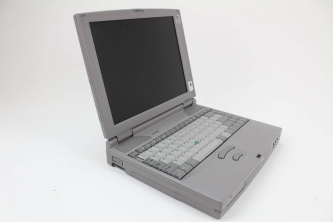
That modem was our ticket to something bigger. We’d had the laptop a year or two when I started wondering what it could really do with games. I remember one night, walking back and forth in our hallway, talking to my best friend on the phone - back when that was our only lifeline, long before Discord or any of that. He’d called me from his house’s second line because his main one was tied up, and over the crackly connection, I caught these faint, strange sounds…clicks, clangs, murmurs. “What are you playing?” I asked. “Ultima Online,” he said, casual as anything. Naturally, I prodded him: “What do you do in it?” And then he unleashed this flood of possibilities that left me reeling. He talked about sneaking up to someone, peeking into their bag, and swiping their stuff without them noticing; poisoning a loaf of bread and handing it off to some poor sap; wandering the wilds to fight monsters, gather resources, craft weapons, build a house, stash your loot. It just kept going. To me, games had always been simple; you jumped on bad guys like in Mario or Sonic, shot them in Doom or GoldenEye, fought them in Mortal Kombat, or raced them. But then he dropped the bombshell: every single character in UO was a real person. I figured he meant a handful of players, like the 2-to-8-player matches I was used to. I couldn’t wrap my head around it thousands of people, all in one living, breathing world.
I was hooked before I even touched it. The next day at school, he slipped me his demo disc, and that night I raced home to load it up. But the demo? It was a letdown. It wasn’t online…just a flat, offline slice of the game with graphics that felt rough even back then. I wandered around the town of Ocllo, chatting up stiff NPCs, until some wizard sent me on a checklist quest: gather stuff, forge a glass sword, slay a dragon terrorizing the place. I did it, killed the dragon, and that was that. The next day, I handed the disc back to my friend, unimpressed. “That’s not the real game,” he insisted. I didn’t get it…every demo I’d ever played was a perfect little taste of what was coming. This just felt like a dud. Months later, though, we were back on the phone, and he was still lost in UO. I could hear it…the clatter of swords, the hum of that world…and it tugged at me again. He made me a deal: he had an extra account I could try. The next day, he brought the disc back, and after an agonizing hour of patching over our creaky 56k modem, I hit the login screen. That famous UO login screen.
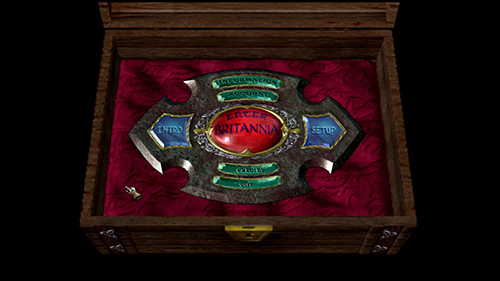
It was like stepping into a dream. I spawned in a town teeming with life…hundreds of people, real people, milling around, chatting, trading, role-playing like it was second nature. I’m sure my mouth hung open, a kid staring at something impossible. I stumbled through the crowd, lagging hard thanks to the dial-up and all those players packed in one spot, until I spotted a stray cat. My friend had said you could do anything, so I tested it…I attacked the cat with my sword in hand. The pitiful yowls echoed through the speakers, and my brother came barreling in, wide-eyed. “What is that?” he demanded. “Ultima Online,” I said, grinning, and I told him every figure on the screen was a real person, from somewhere out there in the world. We just stood there, soaking it in, two kids dumbfounded by this living, breathing place. Everything my friend had rambled about snapped into focus. I was done for …completely, utterly hooked. I remember double-clicking the sword…or maybe it was a dagger…clutched in my character’s hands, just to poke around and figure out what this strange, boundless game would let me do. A little prompt popped up, nudging me to pick something to use the blade on, and my eyes darted across the screen. Naturally, they landed on that poor pixelated cat I’d just taken down moments before, its tiny sprite lying still on the ground. I clicked it, half-expecting nothing much, and then…bam…I’d skinned it. Right there in the corpse were scraps of meat and a hide, just waiting for me to scoop them up. I must’ve sat there blinking at the screen, a kid floored by the sheer wildness of it all. Even now, in 2025, I can’t think of another MMORPG that lets you reach out and touch the world like that…every little thing alive with possibility, every interaction a surprise. UO didn’t just give you a game; it handed you a living, breathing place where even a dead cat could turn into a story. This is a game where the world continues on, even when you’re not playing. A persistant world ever changing just like the real world before and after life. A truly virtual world.
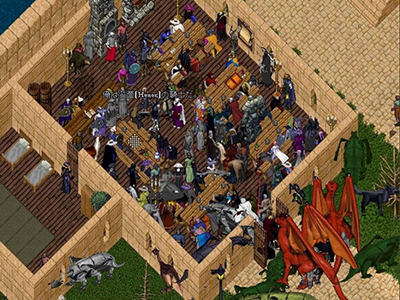
There was a hitch, though: UO wasn’t free. It was $10 a month, and we were kids with no cash to our names. How do you convince your parents to not only buy a game but keep shelling out $10 every 30 days to let you play it? We begged, we bargained, we probably promised to mow the lawn for a decade. Somehow, they caved…but we had to wait until the school year wrapped up. So, come late May 2000, we tore off to Best Buy, found a stack of Ultima Online: The Second Age boxes on the shelf, and grabbed one. We ripped it open right there in the car…manual, map of Britannia, the whole deal. It was our first big-box PC purchase, not just some cartridge or disc, and it felt monumental. I still have that box, 25 years later, perched on my shelf like a relic. The pages are worn thin, the map’s edges frayed, but every time I crack it open, I’m right back there…a kid with stars in his eyes, holding something that promised a whole new world.
That summer of 2000, we burned through our dial-up minutes like it was our job. Our parents must’ve been ready to pull their hair out…no one could call the house with the line tied up all day…but we didn’t care. UO was worth it. The stories from that game could fill a book, and I’ll get to them someday, but those first couple of years are burned into my soul…some of the best gaming memories I’ve got. We got banned by August of 2000–it was probably for our own good, but as you know kids don’t give up that easy. We found ways to sneak back in: free player-run shards, friend’s account, even roping a buddy’s grandma into paying the sub. We kept playing, and here we are in 2025, still logging in, still chasing that old magic.
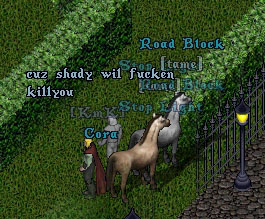
Above - and below - you’ll see a few of the only surviving screenshots of my character, “Slim Shady,” snapped just before our household got the banhammer from Ultima Online and my character wiped from frustration and lack of understanding I would return to the game. The name shows as ‘Cora” because I was using a disguise kit to sneak up on the now hidden player to snoop and steal. It’s frozen in time…August of 2000, a fleeting moment from that wild summer when the game owned us. Back then, I didn’t think to save every second of it; I was too busy living in Britannia, too caught up in the chaos and wonder to hit “print screen.” But others in our little community…they were the archivists, the ones with the foresight. Thousands of images, little shards of our shared past, got captured by folks who loved UO as much as I did. Around 2021, those pictures resurfaced, uploaded for all of us to sift through, share, and get lost in again. I remember scrolling through them, heart pounding, hoping to spot a familiar face from those dial-up days. And then, there he was…Slim Shady, staring back at me, a pixelated ghost from a life that feels a million miles away now. Luck smiled on me that day; I made the cut, a tiny piece of my story preserved among the flood of memories. It’s bittersweet, viewing that screenshot…like finding an old photo tucked in a drawer, a reminder of a time when every login felt like stepping into something limitless. What was a game mechanic of snooping and looting, became a friendly snapshot of life and community. Breaking out into popular songs of the time being a reminder of how alive the game felt and community driven. The early days of the online community was a rather social experience. Oh and just a heads up. At the time I was a young teenage boy, obviously inspired by hip-hop artists. So excuse the colorful lyrics!
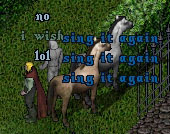
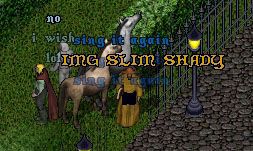
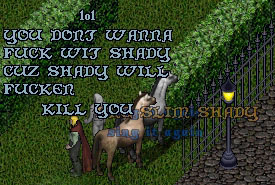
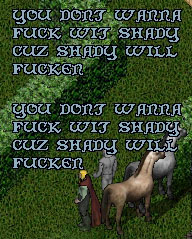
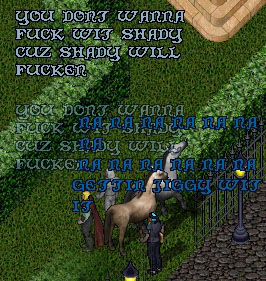
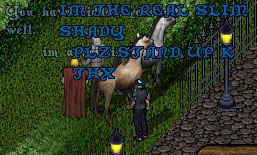
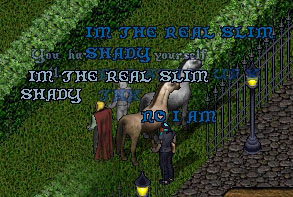
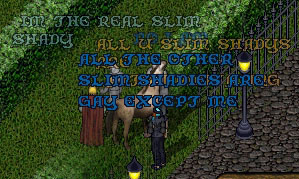
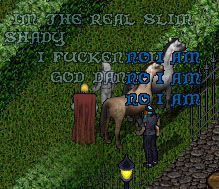
When our house finally upgraded to DSL, UO turned into something we could share. No more fighting over the modem…we were always connected, and it was glorious. We both started saving up for new machines. I snagged a 2001 Dell Inspiron 8200…technically for The Elder Scrolls III: Morrowind, but let’s be real, most of my hours went to UO.

My brother got a Dell laptop too, and soon we were posted up in my room, late into the night, screens glowing side by side. We’d roam Britannia together, fending off in-game murderers, laughing and yelling as we went. Those MIDI tunes…those lonely, distant melodies…are carved into my brain. They take me back to those nights, just two brothers being brothers, living in a world that felt like ours alone.
That summer of 2000, when I wasn’t glued to UO, I was lost in my head, daydreaming about it. I’d imagine MMORPGs where you could tend houses, mow lawns, trim bushes, look after pets…all in a modern twist on that wild freedom. I didn’t know then that UO’s magic was a one-of-a-kind thing. When EverQuest rolled in, it shifted the whole genre…more structured, more guided, less “do whatever you want.” That’s why UO still stands out, why it’s still kicking in 2025. No UO 2 ever came, no modern sandbox to match that old dream. Instead, we got polished clones of the EverQuest formula, and they just didn’t hit the same for us UO diehards. So, my brother and I still fire it up, playing like it’s 1999 all over again, chasing that first rush.
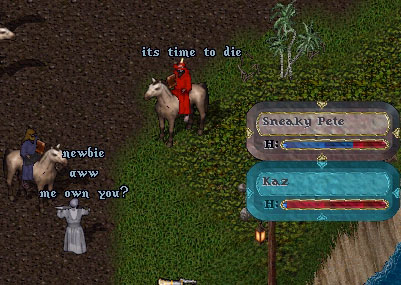
This post’s sprawled out longer than I meant it to, but UO left a mark on me I can’t shake. It sparked this hunger for online worlds, sent me chasing that same wide-eyed wonder I felt back then. I’ve been at it for decades now, always waiting for the next big thing to recapture it. Big MMORPGs have come and gone…shiny, successful ones…but none ever hit me like UO. I know my brother feels the same, and so do a lot of us who were there in the dial-up days, when the internet was still this wild, uncharted frontier. No game, no online experience, ever came close to that impact.
I still catch myself daydreaming about UO…not what it could be now, but what it was. Going back to it these days, the spark’s dimmer, and it’s not the game’s fault. It’s us. The internet’s everywhere now, in our pockets, and that raw, innocent awe we had back then? It’s faded. New shards pop up, built by dedicated fans, but the things that made UO jaw-dropping…the hanging out, the trading, the role-playing…they’re mostly gone. People don’t linger anymore. They rush to max out skills, snag a house, grind for loot, like it’s a checklist instead of a world to live in. For me, UO was always about that shared life, those human connections in a virtual space. Back then, seeing someone online felt like a miracle…now it’s just Tuesday. Everyone’s so used to it, they’re less social, more mechanical, racing to the endgame. When I think back to those early days, I can’t help but ache for how much more alive the internet felt then, how much bigger it seemed compared to the polished, predictable hum of today.
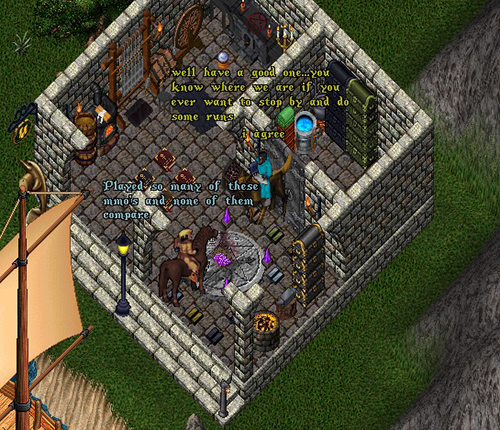
Still, I wander Britannia almost every weekend. I visit the old spots…player towns that used to buzz with chatter and clinking mugs, now quiet as graves. Houses still stand after 25 years, candles flickering in empty inns by the sea. Once, these were havens…places where role-players swapped tales, where we’d band together to fend off murderers crashing the party. Now, they’re just echoes, ghost towns of memory. When “swamp_a.mid” drifts through the speakers, I’ll stand in one of those abandoned spots, staring at the silence, and it hits me hard. The inn’s still there, the seaside still laps at the shore, the candles still burn…but the people who made it alive, they’re long gone. It’s just me and the music, a kid’s dream flickering in the dark.
_brandon